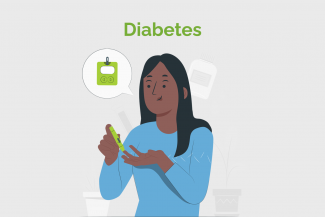
What is Diabetes or Diabetes Mellitus
Diabetes Mellitus is a metabolic disorder in which the body has difficulty regulating its blood glucose or blood sugar level. Blood glucose is the main source of energy for the body and we get it from the food we eat which is broken down into glucose. For glucose to get into the cells, insulin, a pancreatic hormone is required. In patients with diabetes, the pancreas produces less or no insulin or the cells don’t respond to the insulin produced. This leads to the accumulation of glucose in the blood which is then excreted out of the body in urine. The body loses its main source of fuel even though the blood contains large amounts of sugar.
What is the difference between hypoglycaemia and hyperglycaemia?
Hyperglycemia is increased blood sugar in the range 100-126 mg/dl. Hypoglycemia is low level of sugar in blood, which leads to sweating, palpitations, increased respiratory rate etc.

















